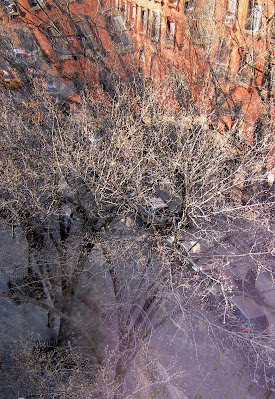"...seen in a purple light...arranged with big hands...
its heroic attitudes...purple on purple sets around..."
- whittled Stevens, Wallace - from 'The Snow Man'
"Husserl's term,
epoché,
the negative move
whereby we bracket
the world,
is not a “step”
hat we do first in
effort to prepare
ourselves for the
later “step,”
reduction proper;
rather, the bracketing
and the move
whereby we drive
the self
back upon itself,
the reduction proper,
occur together."
- Wikipedia - BUT reading this out loud, and slowly, by god and blackbird, I swear, no complacencies or Pinot Noir, it sounds like Mr. Stevens, thusly I shape the text, or try, to appear as, perhaps to be, a poem by the maestro late of Hartford.
Symphony No. 66, Hymn to Glacier Peak, Op. 42 —Alan Hovhaness:
><><><><
"A being entangled in time is also entangled in narrative"
- found quote anon. random
for Valerie -
Again, upon Kingfisher's wings I blow these kisses,
this music, your patient ear awaiting the purist pearl,
for you were once the bequeathed, escaped girl
without fear of oceans, this one between us which
now must be overflown to reach you.
10 years ago -
perfect timing as I now sadly
resistantly prepare to return to the City, my street, my box tomorrow leaving these high mountains and, yes, and presently falling Hallelujah SNOW on new purple buds on gray tree limbs -
I was hanging
in epoché out my 5th floor (top floor) window, new buds demonstrating as event that "spring can really epoché me, up the most" as verb, as -ing, reducing me moi to "WHA'?'s rumored magick invisibly within worlds within worlds alla sudden purple winks.
'Hood drunk, I stagger down stairs wanting to, eager to, embrace every tree, caress each car hood, ornament or no, shake hands with stoop rails, bless every/each concrete crack, crooked smiles' explicatives all, anything goes cuz Wallace Steven's "purple light" ignited an explosive tho unitive storm outside (though there is a rumor that there is no outside) yet inside (ditto rumor con-iterative), beside/outside myself with outsized ecstasy just as I was only a few moments ago feeling depressed that I must leave this majestic overwhelming and reorienting mountain ridge to urban inanity when I bleary see tiniest snow flakes teasing into spruce green giving in, waving, gently from snow weight.
Today, from pallet I leap up, tighty whiteys, slide open the glass doors and run into the, another, event, end of April gift of snow before I go to god knows what waits post 6 hours drive below, south of this daily high north steep hills embrasure, ribs tip top ridge winks spruced up dividing sky from here-below. I laugh near brown but just greening grass that, in my boy joy, that I have managed to unconsciously put on my flip flops in my laughing free fall forward toward flakes but the wet rubber scrunch-scrunch per step accompanies the otherwise silent worship service of nearly naked me growing ever pinker in the cold, knees shaking for, what? freeze or joy. Both, I venture.
So. This old picture of me leaning into changes 10 years back to, officially old me, now just turned 73 - who? me? - and/but still capable of ecstasy all the better and indiscreet (but whom? not trees) "in me draws" on a ridge dipping steeply to brook and boulders incapable of slander...unexpected grace, a gift to bolster me as I prepare for departure for the daily disruption of utter crowd crash, push, rush, muster, blah blah the live-long bray masses, all the shhhhushhh - endings of metro- schizo- mundo pressed down and shaken together - call it democracy - what you wanna or will but as for me, my hermit now riz and riled, all smiles for gratuitous nature's snow, new buds equanimous (fun word to say - real fast 3 times), zennish, like Angelus Sileiius's rose, "budding without why" unlike myself though I expire, I mean ASPire, too often a child's prayer cuz life stares one down, at least, life-leased at best, me down. But for the moment I'll bleat, clap hands, sing praise.
Hang on to present it, then, arrive in thither city eventual - withered/embittered.
Now's this evergreen event-plummet fresh from cooler blankets to slightest blanket, rather, thinnish fabric, of snow.
Did I say "zennish"? at same time 'm swollen, swelling still, mit Bacchanal JOY in tremblin' withers.
Did I say "Praise"? a verb, the better sounded than noun-ed. Where's my crown? that crow black stares me down, almost here it think, judge, "Effusive."
So be it. For the moment I take refuge in EFFUSE, a flake with countless flakes near scrub shrub, limbs, needles, toe wiggle and tidd-ly my thinks. I'll not budge (am not, I signal to Judge Crow, me projecting again, a friggin' budgie but nod, not eye blink, pretend a bird.
Or, better, I'll Stevens-conjure a blackbird or more (who's counting). Both Judge C. and me the better for the not-banter though I'll stammer on into city of me where from my window I count crows at the foot of a water tower mirage impression that they are turning it, a visage even Stevens would take note of, un-grim himself (me, projecting again) and allow.
Jesu Joy of Man's Desiring - Bach Cantata No. 147 - scroll down to cut number 10)
[All -photos by Warren Falcon. All rights reserved]










